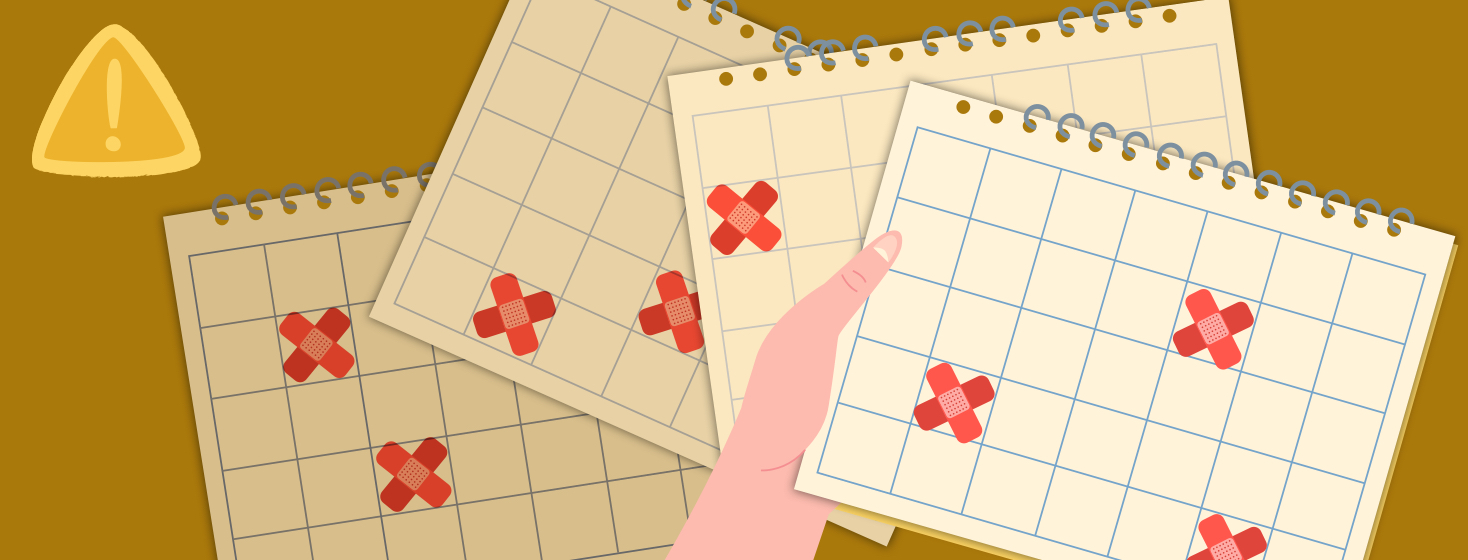Sick Days Before Diagnosis: An MS Retrospective
As someone who writes about health conditions, I constantly read new reports and studies for sparks of inspiration for future projects.
When I came across a 2020 study that pointed out how people with multiple sclerosis (MS) often miss a lot of work prior to their diagnosis, sparks began to fly for me.1
Autoimmune realities
After my MS diagnosis in 2013 – a late discovery at age 47 – I can’t help but wonder about warning signs missed along the way, and whether tending them could have prevented MS.
Of course not. We don’t "give" ourselves MS, it’s the culmination of a number of possible triggers:2
- Genetics
- Previous exposure to Epstein-Barr virus
- A chronically low level of vitamin D throughout life
- Other factors researchers still haven’t confirmed or identified
When these collide in a bright flash of singularity, the first of many autoimmune attacks follow, in the brain or elsewhere.
I can’t deny red flags, such as preeclampsia 25 years ago, a condition with autoimmune disorder links. My doctors still can’t confirm or deny I have rheumatoid arthritis, an autoimmune condition of the joints. And 30 years ago, a doctor diagnosed me with spastic colon, with its own autoimmune potential.3
Sick girl blues
When I read the study mentioned above, I responded with a loud, "Aha!"
People who know me know my work ethic is strong. For instance, I completed work for the Oprah Winfrey Book Club in the early 2000s while nursing mycoplasma (walking pneumonia) that lasted 3 months.4
I’ve never taken a sick day "just because," partly owing to the fact that, since starting work in earnest in the 1980s, I’ve never had enough PTO to waste it so foolishly. Even in high school, I missed about 7 weeks of school in my junior year due to mononucleosis, which I contracted again 3 years later.
Missing work due to illness
How many workdays have I lost to illness over the years? At least 2 weeks annually, well before my diagnosis.
Usually, these sick days were related to chronic infection, bouts of "whatever-itis" (laryngitis, bronchitis, sinusitis) which lingered, eventually leading to mycoplasma which has ties to, you guessed it, MS.5
I was sick so much that, even after freelancing from home while raising my girls, we had to develop a sign language and clapping system so they could hear me speak without it draining my energy just to summon the breath to do so.
Back to that study
The study aimed to explore diagnosis-specific workplace absenteeism and sick-day benefits among workers with MS both before and after diagnosis.2
The 8-year study examined more than 2,500 people with MS diagnosed between 2009 and 2012. It found that people with MS missed, on average, more than 10 days of work due to sickness 4 years before diagnosis. After diagnosis, the sick-day average spiked to nearly 70 more missed workdays compared to healthy controls.2
Of course, this spike is likely attributed to those added visits for lumbar puncture, MRI, blood tests, evoked potential tests, and neurological exams done in the name of confirming diagnosis.
Which makes sense, right? I mean, ask anyone with MS – they’ll tell you that having this disease is, in some ways, its own full-time job.
What about before diagnosis?
I’m more interested in those pre-diagnosis figures, though. After all, even if my reasons for missing work since the ‘80s aren’t directly related to MS, the study confirms people with MS tend to deal with a larger range of other conditions.2,6
These can include depression, other autoimmune disorders, and common infections. Bladder and kidney infections, for instance, frequently land people with MS in the hospital.6,7
And here’s where hindsight comes in and kicks the tire: I was hospitalized with a kidney infection at age 9, just 2 weeks after experiencing my first-ever MS hug. More time off! I missed the first week of 5th grade that year.
There’s no way I, my family, or my doctors could’ve known from that incident – or all the others that followed across the decades – that I was staring at a subterranean case of MS.
Thinking about all the warning signs we may have missed
How useful is this "woulda, coulda, shoulda" thinking, post-diagnosis? Honestly, not very. We can make ourselves crazy thinking about potential MS warning signs. In the end, the outcome is still the same.
So, I practice "dealer’s choice" these days. Even if I marvel at the puzzle of my MS as its origins continue to emerge, I choose to spend my days not counting red flags but instead looking for ways to defend against the next infection, the next hug, the next flare because, well, that’s a full-time job, too.

Join the conversation